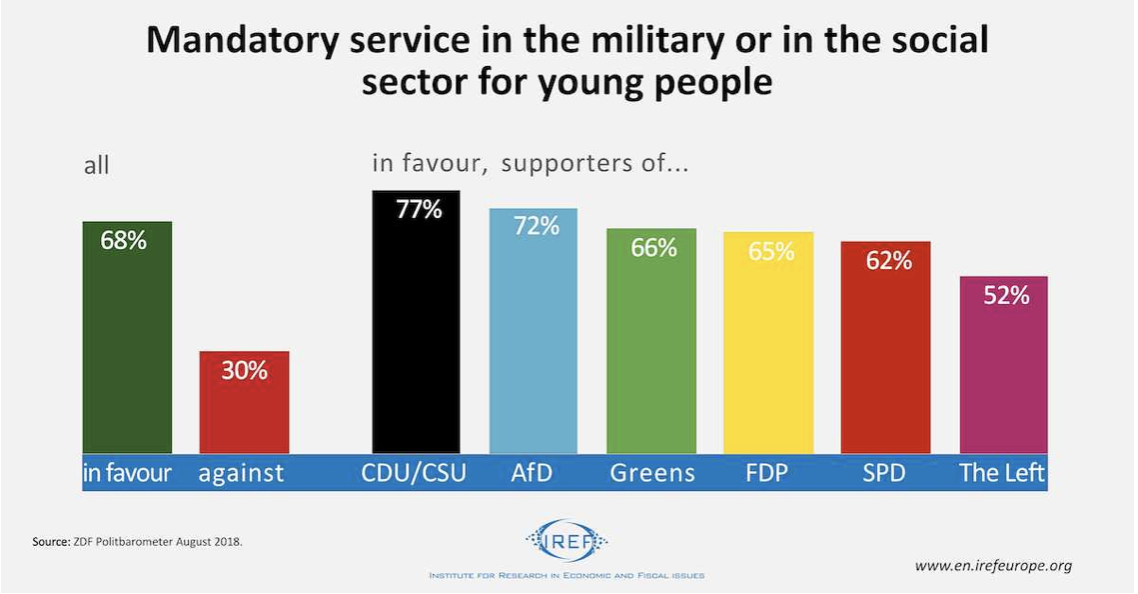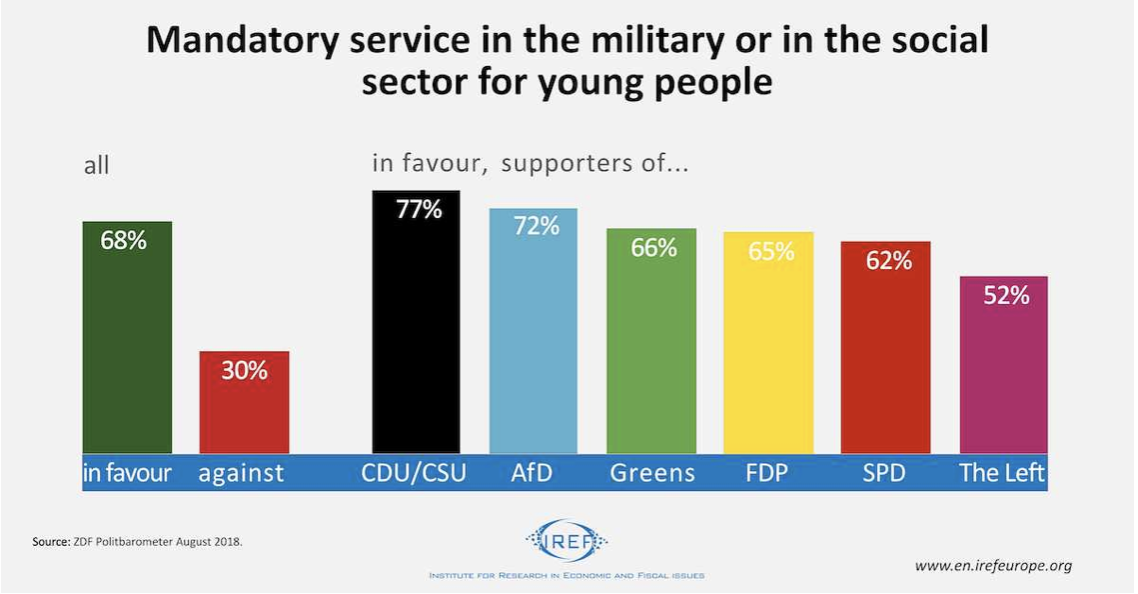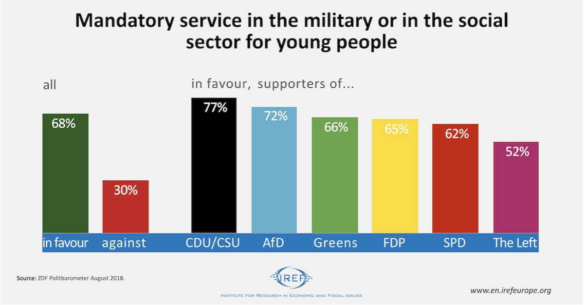“This state is not for free,” said the recently-elected leader of the Christian Democratic Union, Annegret Kramp-Karrenbauer, promoting a mandatory year of service in the military or in the social sector for all 18-25 year-olds. The idea seems well-received among the population: a survey by Politbarometer, an election poll run by public-service channel ZDF, indicates that 68 percent of eligible voters support the introduction of a compulsory year-long service to the community. Although it may sound desirable to strengthen values like solidarity, empathy, or a sense of responsibility among young people, there is little evidence of positive effects strong enough to justify such a massive restriction of young people’s freedoms.

Annegret Kramp-Karrenbauer is not the only German politician keen on introducing a mandatory year of service. The CDU’s youth organisation, Junge Union, hopes to “support social cohesion” by introducing a service obligation. Norbert Blühm, CDU, expects social service to foster a sense of “overall responsibility of all citizens” and to serve as a “school of empathy”. Karl Lauterbach, the Social Democratic Party’s healthcare expert, considers the service “not fundamentally wrong” as a measure to mobilise workers for welfare services.
Just like Compulsory Military Service: Direct Costs to those Affected
While advocates of the idea of a mandatory service to the community emphasise its hoped-for utility, the academic literature predominantly analyses the expected costs.
A compulsory year of social service is, like compulsory military service or alternative civilian service, an implicit tax in kind. Instead of paying one’s tax liability in monetary form, it is satisfied through labour. The direct costs to the draftee consist of the difference between the market value of their work and the governmental compensation they receive during their year of service. Like all taxes, this implicit tax constitutes a burden to the taxpayer.
Panu Poutvaraa from the Ifo Institute and other economists have investigated the effects of compulsory military service that could also be applied to a year of mandatory service to the community. They emphasise that conscription affects young people at a time when they are most likely to build up knowledge through education, apprenticeship and early work experience. The interruption reduces the advantages of knowledge building and lowers the incentive to stay in education after graduating from school. Hence, the obligation to serve, whether in the military or in welfare organisations, constrains young people in their pursuit of qualifications and skills.
Moreover, conscription delays entrance into the labour market. This forces the affected citizens to miss out on their last, and usually relatively high, salary before their pension. Lost wages during the time of service, lower accumulation of knowledge, and the delayed entry into the labour market reduce lifetime earnings of those affected, resulting in lower economic growth.
Just like Alternative Civilian Service: Indirect Costs
Thomas Bauer and Christoph Schmidt point out further indirect costs: The low-cost employment of civilian servants distorts the relation of costs between labour and capital in nursing homes and other welfare services. If it is possible to employ workers relatively cheaply in these services, the incentive to stay up-to-date technologically and pursue administrative efficiency is diminished. These authors analysed the effects of compulsory military service. Yet, a mandatory service year in the welfares-state area may be expected to have similar consequences. Those employed in mandatory services would not be paid at market-value rates, and would keep prices and wages in the social-service market artificially low. Eventually, qualified staff would leave. A mandatory social service could, thereby, increase the shortage of skilled workers in the care sector.
“Mandatory Volunteering”: An Oxymoron
The direct and indirect costs of mandatory services have been examined in detail. The hoped-for benefits for personality development among young people, however, are not. There exist only a handful of studies about the effects of a relatively short-term mandatory service to the community, with regard to a sample of high school pupils and college students in the US and Australia. According to the results, the so-called ‘mandatory volunteering’ can increase young people’s willingness to take up social responsibilities. Preconditions of these results are an embodiment of the service into the curriculum, and the possibility to freely choose the type of service provided. If these conditions are not fulfilled, ‘mandatory volunteering’ can have a rather detrimental effect. For instance, coercion into community service can reduce people’s motivation to engage in voluntary activities in the future. This means that a long-term connection to society cannot be guaranteed and might even be weakened.
Merely a Symbol?
Representatives of charities have also taken a rather critical stance towards a mandatory year of service. Wolfgang Stadler, chair of the Arbeiterwohlfahrt (AWO), one of Germany’s biggest charities, has labelled the mandatory service year as “an idea of the silly season”. According to AWO, “a social year can bring huge gains for young people […], but only when it is voluntary” – this refers to the state-funded ‘voluntary social year’ programme existing in Germany. Ulrich Schneider, head of the charity Paritätischer Wohlfahrtsverband, even claims that it is unnecessary to employ “700,000 young people per year, half of whom have no idea what they’re supposed to be doing during their time with us”.
Social Service: Serving Society?
One aim of those supporting the mandatory year of service is to strengthen social cohesion and to encourage young people to take up jobs in the social sector. However, the literature provides no reliable evidence of such effects. The mere hope for positive effects does not justify the obvious costs in the form of restricted freedom, reduced education, lost lifetime earnings and lower wages in care jobs. Instead of attempting to coercively create a sense of community, politics should rather guarantee a reliable framework of rules enabling citizens to participate in positive-sum games, which can foster reciprocal trust.




